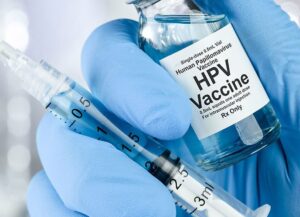HPV Vaccine:
Positive developments for public health! According to recent data from pharmaceutical giant Merck & Co. Inc., sales of the human papillomavirus (HPV) vaccination, which guards against a number of malignancies and genital warts, have increased by 29%. This corresponds to a startling $8.9 billion in sales, indicating a major shift in vaccine use and maybe a tipping point in the battle against diseases linked to HPV Vaccine.

Why is HPV Vaccine important:
The HPV vaccine is a ray of hope in the fight against the world’s most common sexually transmitted illness. Its impact is incalculable given the millions of cases that occur each year. This vaccination protects against a range of malignancies, including those of the head and neck, cervical, vaginal, and anal regions, in addition to preventing HPV itself. Targeting high-risk HPV strains provides an essential safeguard against potential health hazards in the future. By promoting mass vaccination, we protect individuals and enable communities to lessen the incidence of related cancers. It is proof of the advancement of medicine and provides vital safeguards for a healthy future..
What’s behind the increase:
Sales of HPV vaccines are increasing due to a number of factors:
Raised awareness: Parents and individuals are making better decisions as a result of public health campaigns and educational programmes that increase knowledge about HPV and the advantages of vaccination.
- Expanded recommendations: Prominent health institutions, such as the Centres for Disease Control and Prevention (CDC), now advise HPV vaccination for girls and boys beginning at age 11 or 12, increasing demand and the target demographic.
- Lower financial barriers: Families can now more easily obtain and afford HPV vaccinations thanks to improved insurance coverage. Concerns of affordability in environments with limited resources are also being addressed by government programmes and initiatives.
- Celebrity endorsements: When public leaders and famous people talk about their personal experiences getting vaccinated against HPV, it can greatly change public opinion and promote vaccination uptake.
What does this mean when moving forward:
Increased sales of HPV vaccines are a step in the right direction towards lowering the risk of HPV-related malignancies and the accompanying medical expenses. This trend has the potential to: • Reduced cancer burden: With higher vaccination rates, we can anticipate a significant decrease in HPV-related cancers in the coming years, saving lives and improving overall health outcomes. This trend can also be combined with ongoing efforts to increase awareness, accessibility, and affordability.
- Savings on healthcare costs: Lowering the risk of certain malignancies results in lower medical expenses for diagnosis, treatment, and long-term care.
- Better quality of life: Vaccination reduces stress and worry related to possible HPV infection and future health risks in addition to shielding persons from acquiring these cancers.
Looking Forword:
Closing the immunization rate gap is still crucial, especially in groups that are less fortunate, notwithstanding recent increases in sales of HPV vaccines. Ongoing programs have to concentrate on outreach, education, and accessibility. We can close this gap by making vaccines conveniently and affordably available in underprivileged populations. Education efforts that highlight the significance and safety of the vaccine should debunk myths and false information. Targeted outreach initiatives, such as community partnerships and mobile clinics, can successfully reach underserved populations. Furthermore, trust and uptake are increased when healthcare providers receive help in providing culturally sensitive care. When combined, these programs help lessen inequalities and shield everyone against illnesses linked to HPV.
- Raise public awareness: Disinformation and vaccine reluctance can be addressed by educational campaigns aimed at various populations.
- Address the issue of affordability: To reach all populations, it is essential to guarantee equal access through government programmes and insurance coverage.
- Fortify advice from medical professionals: Uptake can be greatly impacted by actively urging medical personnel to suggest HPV vaccination during routine appointments.
Thanks to the power of vaccination, we can build a future where HPV-related malignancies are a thing of the past by tackling these issues and maintaining the current pace.